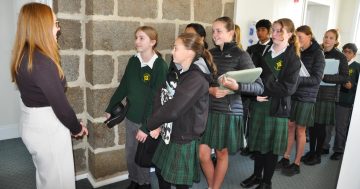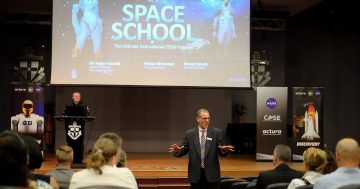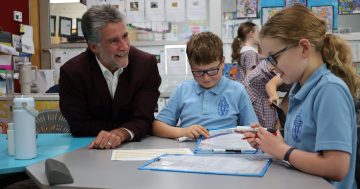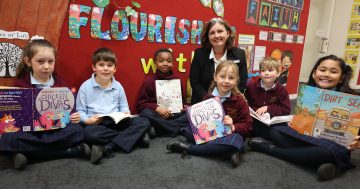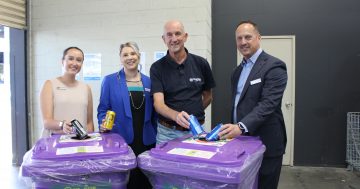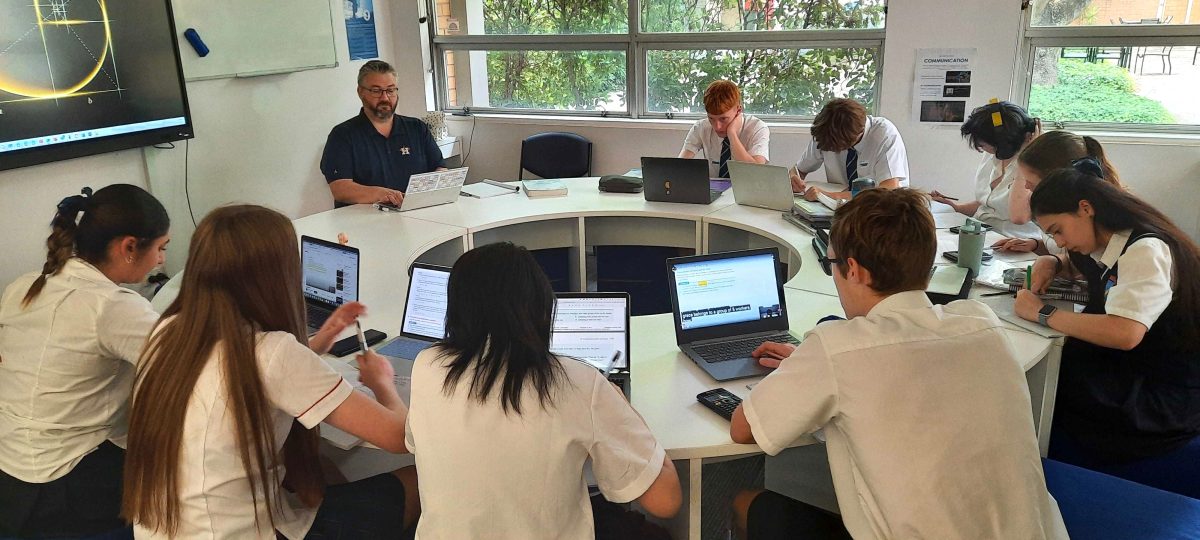
CECG virtual learning students from across the region came together at Merici College last week. Photos: Ian Bushnell.
A virtual learning program is helping to overcome the tyranny of distance and keep young people with their families and communities while opening up pathways to higher education they might otherwise not take.
Catholic Education Canberra and Goulburn is in the third year of its virtual learning program, which grew out of the COVID lockdown when students were forced to continue classes online from home.
The program uses Microsoft Teams, is open to Year 11 and 12 students, is considered to be age-appropriate, and operates across the archdiocese from the coast to the mountains and north to Temora.
Last week, 68 students and 10 teachers from ACT and NSW schools joined a virtual learning camp at Merici College.
Participating schools this year were St Anne’s Catholic College, Temora; McAuley Catholic College, Tumut; Lumen Christi Catholic College, Pambula Beach; St John Paul II College, Canberra; Merici College, Canberra; St Clare’s College, Canberra; and St Edmund’s College, Canberra.
St Edmund’s is an independent Catholic school and not a part of the CECG system, but it understands the value of the virtual learning offering.
The program opens up more subjects to students, and for those in rural areas, it means they don’t have to change schools or go to boarding school to pursue their study choices.
The camp gave students and teachers the opportunity to meet each other, sometimes for the first time, in person.
It focused on forming personal relationships, setting expectations, learning how to use virtual mediums effectively, and for teachers to share resources and improve their tech skills and expertise.

Trinity College Goulburn students Samantha Marks and Neha Promod have been able to study Biology online, something they couldn’t do at school.
Trinity College Goulburn students Samantha Marks and Neha Promod take Biology online because it can’t be fitted into their packages. Samantha wants to be a marine biologist, and Neha is interested in the medical field.
Without the program, those ambitions would be on hold, or they would have to move schools.
Samantha called it a lifesaver.
“It’s all the same content,” she said, but her Tumut-based teacher did go into more depth and offers that extra information that might not be available elsewhere.
Neha’s package was already science-heavy, but without biology, “you can’t really do anything” in medicine.
She thought she might struggle but actually took to it easily.
Merici College Year 11 student Zahra El-Adhami studies Specialist Maths on top of her school load so she can gain entry into a higher honours degree at university.
Zahra, who loves solving problems, said the online course had enhanced her understanding of her classroom subjects.
“It’s really helped me grasp concepts better, even in Specialist Methods [maths],” she said. “Doing this program kind of helps me understand the content in my other classes a little bit more.”
She would recommend taking on an online course to others.
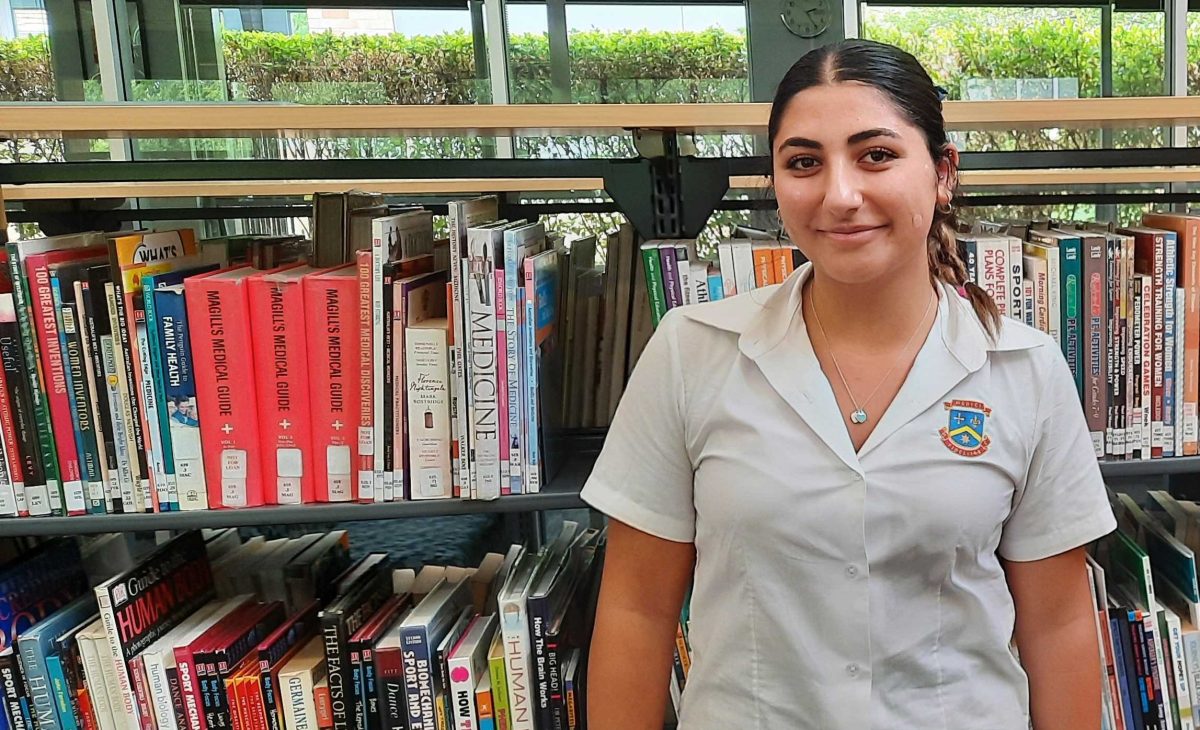
Merici College student Zahra El-Adhami can extend herself and aim for the top at university.
Virtual learning coordinator Wendy Mockler, an economics teacher from Lumen Christi at Pambula Beach, said the program was all about access and equity.
Ms Mockler, who teaches students at St Anne’s at Temora and McAuley in Tumut, said the program was much more than remote learning, which still had connotations of the COVID lockdowns and the emergency response.
She said this was a sophisticated and strategic response to the need in the archdiocese that used specific pedagogies and embedded high-impact learning.
“With significant teacher shortages, the virtual learning collaborative was able to step in and ameliorate some very difficult situations,” Ms Mockler said.
“In fact, we were able to partner one school at Pambula Beach with another school at Young and supply that school with a really top-level team of maths teachers, and one of the students is actually in the New South Wales distinguished all-rounders list and recognised for that.”
Last year, one high-potential and gifted student was able to take an accelerated program, while another was a champion triathlete in need of flexible learning who was able to achieve his HSC.
Another had childhood trauma, ongoing school refusal and lack of engagement, but through the program was able to continue schooling.
Ms Mockler said it meant schools could broaden their offering, retain students and therefore build the capacity and confidence to meet the needs of their families.
“That feedback loop is then supporting vibrant communities in these rural and regional areas,” she said.
Enrolments varied between 60 and 100 in the past couple of years.
“They’re not huge numbers, but they’re critical for the students that are doing them because they’re usually rigorous and really specialist subjects like Specialist Maths,” Ms Mockler said.
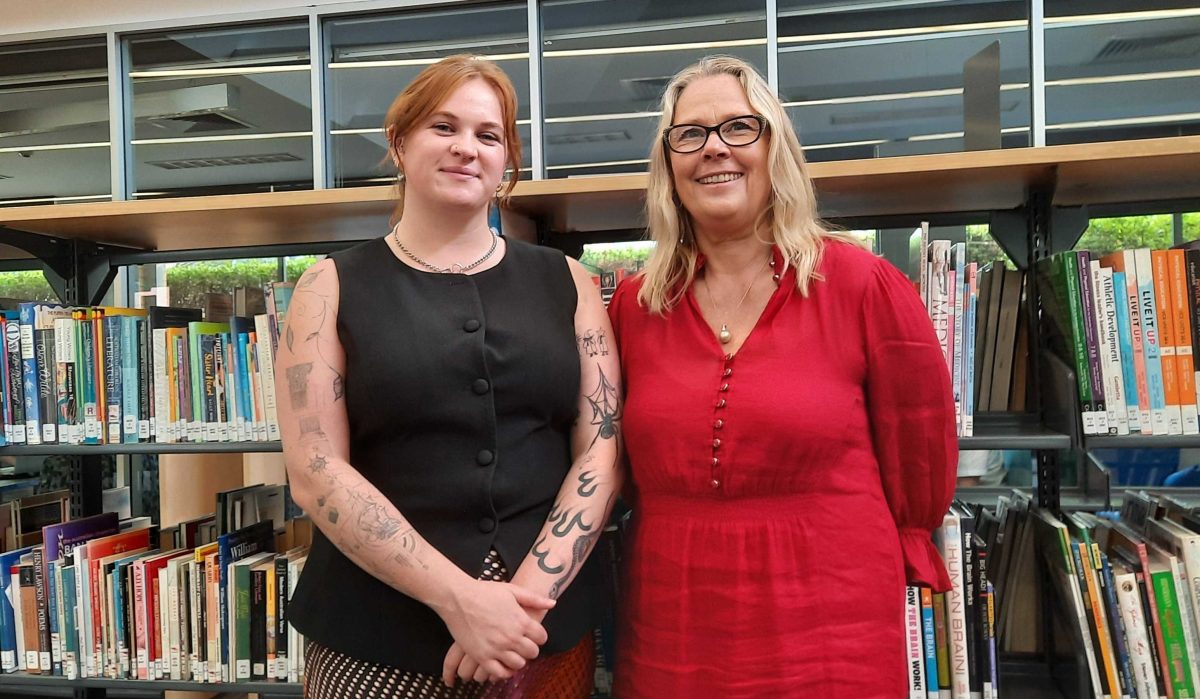
St John-Paul II College Korean teacher Elissa Burt and program coordinator Wendy Mockler were in town for the Merici camp to meet students and other teachers.
Providing her subject area of economics to regional schools had personal significance for her, given it was now limited to metropolitan schools at a time when economics dominated politics and government and financial literacy was so important.
“All of the schools that are offering economics are now increasingly in very well-off SES areas of Sydney and what does that do when we have policymakers that are coming out of limited life experience?” Ms Mockler said.
At first, virtual learning could be challenging, mastering the technology, self-regulating and establishing study habits, but after about four or five weeks, students hit their straps.
It also afforded students a degree of autonomy where they could work at their own pace – faster or slower.
“When a student then builds in that confidence and has that confidence, it’s a game changer for them,” Ms Mockler said.
Teachers in her team also have classes in their schools but some work solely online.
“So we’re building awareness in the community about this viable, alternative approach that allows to differentiate learning,” Ms Mockler said. “It’s multi-modal, it’s collaborative and students are getting good outcomes from it and getting to the courses and the opportunities they want.”
Virtual learning ACT courses for 2025 are Beginning Italian, Beginning Korean and Specialist Maths.
Courses offered in NSW are Economics, Business Studies, Software Engineering and Biology.












